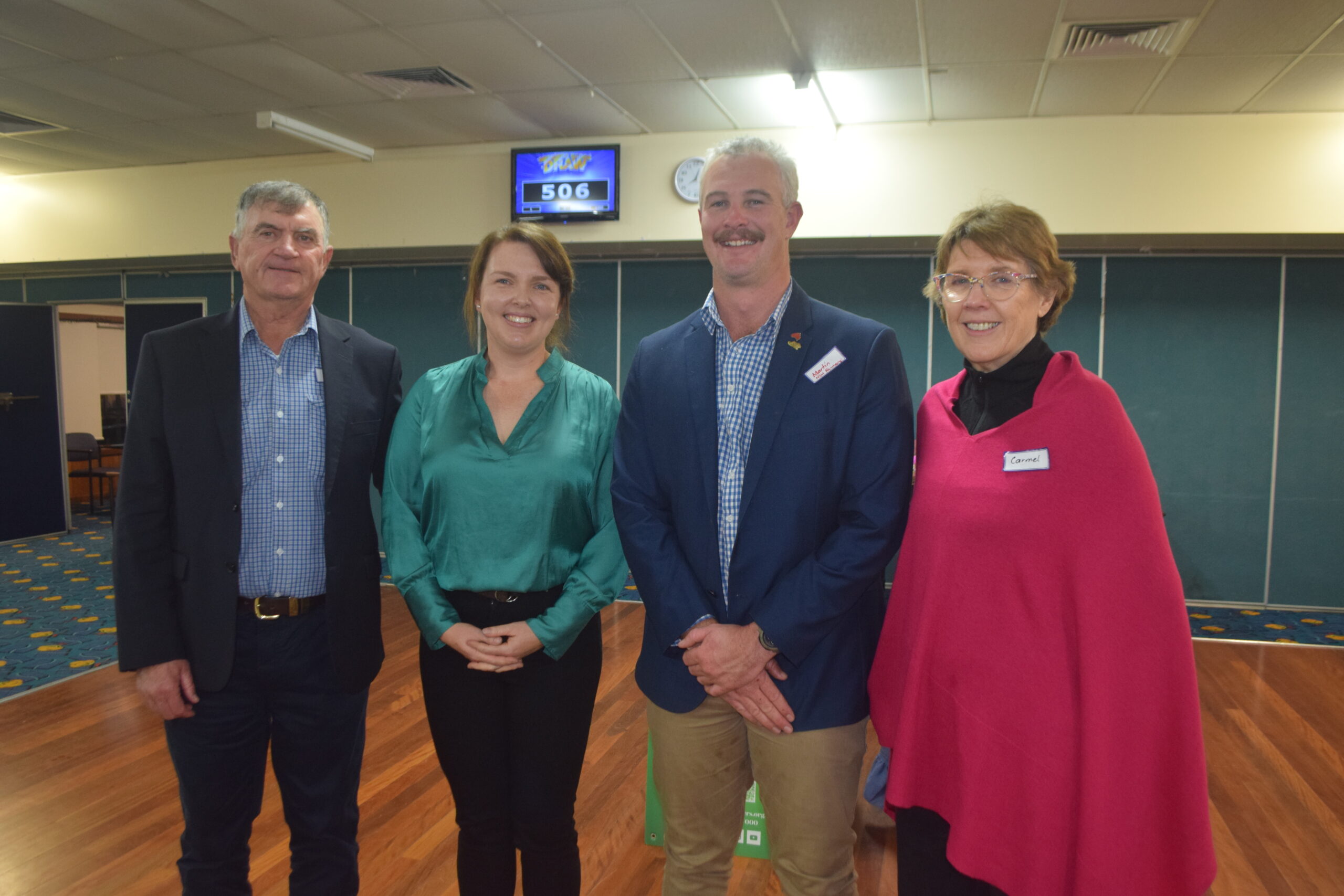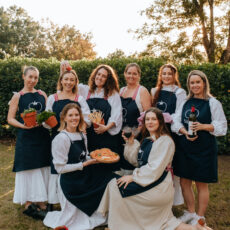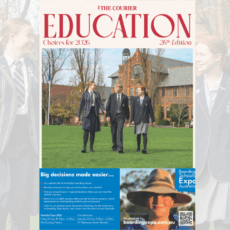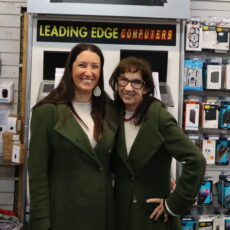Agricultural enthusiasts gathered at the Wee Waa Bowling club on June 14 for a dinner organised by the Wee Waa branch of the NSW Farmers Association.
The community get-together celebrated and encouraged the bright young minds working in the district’s ag sector and NSW Young Farmers chair Martin Murray spoke about the benefits of local youth getting involved in the organisation.
Farmers, growers, graziers, scientists along with agricultural professionals, workers and students enjoyed a fabulous night out, networking, meeting new people and catching up with old mates.
Wee Waa branch chair Jono Phelps warmly welcomed guests, Spring Plains pair Katie and Ben Watson did a terrific job as MCs and guest speaker Dr Rebecca Thistlethwaite captivated the crowd.
Dr Bec, as she is known to most Courier readers, is based at The University of Sydney Plant Breeding Centre for Crop and Digital Agriculture in Narrabri, where she conducts research that focuses on improving the resilience of commercial food crops against challenging climatic conditions such as heat and drought stress.
Working as a plant breeder, Dr Bec has descried her role as similar to a ‘matchmaker of the plant world’ with a mission to upgrade everyday food crops, especially ‘the cool ones like wheat, so they can handle all the tough stuff nature throws at them’.
“It’s not just about making them stronger; it’s about making our food more nutritious and teaching others how to grow it in a way that’s good for the planet and future generations. Science lets me be a part of something bigger, something that helps people and the world,” she said.
While Dr Bec’s remarkable research work has earned her respect and recognition, it is her outstanding communication skills that set her apart.
Last year, she took out a top five spot in the ABC Media Residency Program, among some of the best and brightest in sciences, humanities, and the arts.
Dr Bec also contributes a regular column for this publication, encouraging burning science questions from readers and offering concise and clear answers to complex queries, explaining the science in our daily lives in a manner we can all understand.
“Even though plants have a special place in my heart, my curiosity doesn’t stop there. I’m into all kinds of science adventures,” said Dr Bec when she started her column.
“Let’s explore the wonders of the world together because science isn’t just a subject; it’s a way to make a real difference.
“Ask me anything and let the science journey begin.”
Following her guest speaker appearance at the NSW Farmers’ dinner, the Wee Waa News conducted a Q and A session with Dr Bec, where she said her two main messages for young people in agriculture are ‘to have a voice and also to connect with each other’.
Question – Did you enjoy the Wee Waa branch of NSW Farmers Association dinner and how did you feel about picking up the mic to be the event’s guest speaker?
Answer – It was an awesome night. The dinner was so much fun and a great opportunity to meet a lot of people I hadn’t met before. I got to hear about the work people are doing in our region and also hear what people want to see come out of research institutions like ours’. I was really, really grateful for the opportunity and thankful Georgie Haire asked me and thought the members of the NSW Young Farmers would be willing to hear me speak. I wanted to use the opportunity to not purely speak about the ‘nuts and bolts’ of the science because even though I love it, I thought that it was quite a good opportunity for me to be able to give people the confidence to speak up and do things like cold call researchers on different things and make sure that they – as young people – hold us accountable for what we’re doing and what strategies we’re going to use moving forward. I could see an opportunity there, and I was grateful Georgie gave it to me.
Q. There has been positive feedback about what a fantastic and engaging guest speaker you were on the night – what were your main messages for the crowd at the Wee Waa bowlo?
A. One of the key messages for me, and hopefully for the audience, was expressing the importance of young people having a seat at the table so they get the opportunity to influence research direction and where funds are allocated. But early on in their careers, so even though they might not have the confidence to speak up and feel as though they should have a say, I was hoping that I could get across to the people in the room that it’s really important the next generation, who are coming through now, are having a say and getting the opportunity to change things for the future because eventually they’re the ones that are going to be using the outcomes of the research. And I wanted them to really understand the power of the valuable input they can provide. Another point I really wanted to get across is I think there is a huge opportunity we are missing at the moment between young scientists and young professionals in ag – we don’t really get those two groups to interact with each other enough early on in their careers. And I think the two groups actually share a
vulnerability. If we were to build that rapport, early on in their careers, then they could maintain those relationships right throughout their careers. And potentially, provide much more impact to the research and the outcomes to growers and the way that the research outcomes are actually communicated to growers. I think, as an industry, we’re missing an opportunity there and I hope that the next generation can see that as a path forward. So really, the two main points I wanted to get across was for young people in ag to have a voice and also to connect with each other.
Q. We are fortunate in the Narrabri Shire to have research stations and institutions like the Sydney Uni. campus, it gives a great opportunity for a natural exchange of ideas between growers and researchers because you’re at the same events and living in the same community. You swapped a suburban Sydney beach life to move to the this region, which you and your family now call home – is it good to be part of a community that you’re also working to help through your research outcomes?
A. Being part of the community is everything. I mean, it’s the reason that I moved to Narrabri in the first place to really immerse myself in a prime agricultural region.
And I feel, as an academic, that’s one of the most useful things to me as a researcher.
So, to the research going forward, having that connection and that input of ideas from such a diverse group is great. And also receiving feedback about whether I’m communicating or not communicating something clearly enough – if the research outcomes are not making sense, then people can connect with me on the ground, with phone calls from growers or people and growers come and to visit us in the paddock and see what we’re doing.
It’s great feedback for us as researchers – maybe we do need to change the way we communicate certain things to industry and that could provide a lot more impact in the future.
Q. You’re a great communicator, not an ‘average academic’ and blow the old stereotypical idea that researchers aren’t great communicators out of the water, with brilliant ideas like your regular column ‘Ask Dr Bec’ which engages children, and adults for that matter, as you answer everything from ‘why is the pink slug pink?’ to ‘why does the moon look bigger when it’s just rising or setting, but smaller when it’s high up in the sky?’ – is stepping into the communication space something you enjoy?
A. I used to absolutely hate it and I still get nervous every time I speak. But I have to admit, pushing myself out of my comfort zone in terms of The Courier column and being able to communicate complex science in a much more concise way to a broad audience is one of the best challenges that I’ve had in the last couple of years.
I think I’ve still got a lot of learning to do when it comes to communicating science but I’m definitely trying to do as much as I can to push myself out of my comfort zone.
Q. I understand the Wee Waa branch of the NSW Farmers Association dinner was also about inspiring and encouraging more members as well as youth engagement from the bright young agricultural enthusiasts in our district – generally speaking, would you encourage young people to get involved in agricultural groups and local organisations?
A. I think what the NSW Young Farmers do, especially in this region, is fantastic in terms of advocacy and training young people in policy and ways that they can actually make a difference to the industry. Just the fact the group are able to develop leaders within the industry. We have a really solid way forward if the people that I met the other night are the future of our industry.
Q. It seems there is never a dull moment in the life of Dr Bec – you always have something exciting happening, what’s next for you and is there anything else you would like to add?
A. There are two things I might mention that I’m excited about. So, AgriFutures gave me some money to develop a program called AgriComm Connect. It focuses on bringing the two groups that we’ve spoken about – young professionals in ag and young scientists – together early in their career. We’re going to pilot the program in Narrabri in January 2025 and then, use it as the stepping stone to bring into other regional towns based on the talent and the people they have within their individual town. The other thing to mention, we’re doing a lot of work in developing countries based on research that’s come out of the Narrabri site. And so, it’s another form of communication that is pushing me out of my comfort zone and I’m getting to work with people in Pakistan, Bangladesh and Ethiopia. Each year, I will travel over there and get the opportunity to speak a in a completely different way to these guys and to try to bring all of those partners together to work collectively has been quite a challenge. It’s come from the input from growers in our region to be able to make some of these breeding techniques much better to then take them overseas. So, you know, that’s a direct result of being based in this region.
Dr Bec. Thistlethwaite contributes a fortnightly column on the science in our daily lives. Readers are invited to send their science questions to Dr Bec. via [email protected]
To order photos from this page click here










